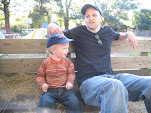Here's how we count today: 1, 2, 3, 4, 5…
This wasn't always the case. 1000 years ago we counted this way: I, II, III, IV, V…
Why the change? Fibbonaci was the mathematician behind the change. The change came because of a question/problem that could not be solved using the system in place. The math problem concerned rabbit reproduction. He ended up having to create an entirely new system in order to solve the problem. By solving the problem of rabbit reproduction, Fibbonaci forever changed the way we do math and count.
Acts 1:8 "But you will receive power when the Holy Spirit has come upon you, and you will be my witnesses in Jerusalem and in all Judea and Samaria, and to the end of the earth."
How do you think the disciples reacted to this proclamation by Jesus? How do we react? Either we chalk that up to grandiose, naïve dreams that are nice to talk about but which we know will never happen, or we admit that there is something fundamentally wrong with our systems, and that we have to start counting differently in order to solve this problem.
Fibbonaci gave us the problem of rabbit reproduction. Jesus gave us the problem of rapid reproduction.
Rodney Stark believes that Christianity grew from approximately 1000 Christians in 40 CE to approximately 31 million Christians in 350 CE (Cities of God, 67).
How did this happen?
What's it going to take for each of us to see rapid reproduction in our own churches?
We need to start with a big dream. Jesus gave us a big dream in Acts 1:8.
- Dream BIG
- Talk about that dream all the time. People need to know about it.
- Dream big, but start small (2 Timothy 2:2)
- Start with yourself – we reproduce who we are; if we want people to be intimate with God, we have to be intimate with God
- Reproduce leaders – for small groups and teams
- Reproduce artists – for larger worship gatherings
- Start with yourself – we reproduce who we are; if we want people to be intimate with God, we have to be intimate with God
- Set goals
Characteristics of big dreams
- The bigger the dream, the more profound the questions you are going to ask.
- Big dreams will begin to change your prayers. You become more dependent on God. There is no way that you on your own can accomplish what you feel God wants you to do.
- Big dreams are contagious.
How do you know when you have the culture of rapid reproduction?
- When you're more concerned with the lost than the found; Jesus left the 99 sheep to go in search of the 1 lost sheep
- When you begin to love the edge (risk) more than the center (safety)
- When you begin preferring the going more than the staying
One of CCC's sayings: Treat them like Christians until they realize that they're not.
